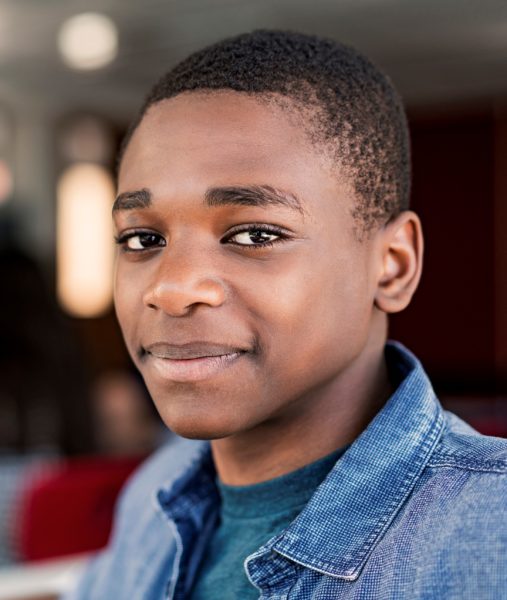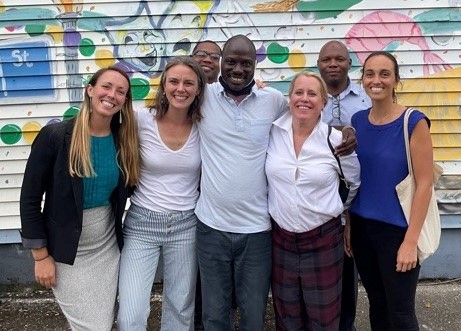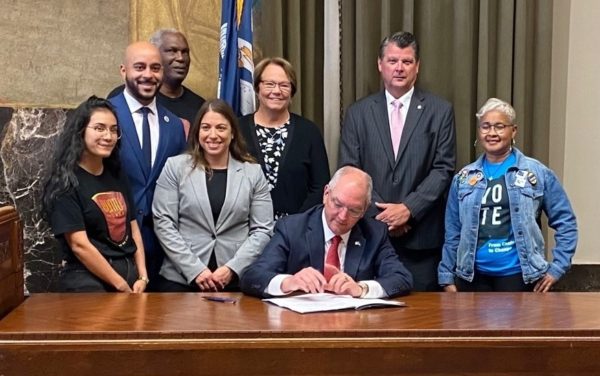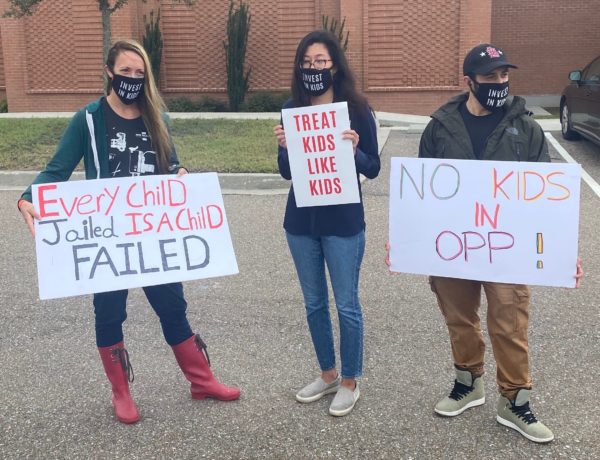LCCR’s fiscal year came to a close on June 30. Here’s a quick look at what your support helped accomplish during this especially challenging pandemic year.
LCCR attorneys defended the rights of 524 children (through 799 cases) in Orleans Parish courtrooms this past year. Meanwhile, our social workers and youth advocates connected our kids with the resources they need to grow up healthy and leave the justice system behind for good. Support from people like you helped:

112 children enroll in school
22 children secure new or improved special education supports (IEPs)
5 children defend their right to an education in school disciplinary hearings
112 children connect with jobs or job training programs
21 children connect with mentoring programs
97 children access care for mental health and substance use disorder
Collectively, these efforts are helping kids like Jalen and Rickey stay at home with family, remain in school without disruption, and see their prospects for success grow.
LCCR started the year with a single social worker in East Baton Rouge, continuing the partnership we began in October 2017 with the East Baton Rouge Office of the Public Defender (OPRBR). Thanks to funding from two new federal grants, in addition to local foundation support, we ended the year with an East Baton Rouge team of four: Licensed Clinical Social Worker Jennifer Dobies, Youth Advocate Jasmine Hastings, and Youth Advocate Ashton Hawkins. We are currently hiring for another open EBR social worker position.
The impact of this expansion will be game-changing to LCCR’s work in East Baton Rouge, allowing us to dedicate more time, support, and resources to the justice system-involved kids there. This past year, we helped support 147 kids in EBR. In the coming year, we anticipate serving far more children there.
HUGE THANKS to DOJ’s Office of Juvenile Justice & Delinquency Prevention for this new funding, the Louisiana Public Defender Board for its partnership on one of the new grants, and the Huey & Angelina Wilson Foundation for its initial seed funding and continued support of our EBR project.
 For three years now, LCCR’s team of Juvenile Life Without Parole (JLWOP) attorneys and mitigation specialists have worked tirelessly to free men and women who had previously been sentenced as children to die in prison. We’re the state’s primary resource for this type of specialized representation, and for good reason: our team is incredible at what they do.
For three years now, LCCR’s team of Juvenile Life Without Parole (JLWOP) attorneys and mitigation specialists have worked tirelessly to free men and women who had previously been sentenced as children to die in prison. We’re the state’s primary resource for this type of specialized representation, and for good reason: our team is incredible at what they do.
Over the past year, LCCR’s JLWOP team represented 70 juvenile lifers, helping 3 get new trials and 5 (and counting!) achieve release through parole. Their success has given people like Terrence, Terrance, and “David” (who was very recently granted parole) the opportunity to walk free for the first time in their adult lives. Every few weeks now, our team is helping a new juvenile lifer achieve a new trial or release. Each victory is deeply meaningful to our team, our clients, and their families. Keep an eye out for more photos like these in the future.
It has been an incredibly challenging year for our kids and their families. We began the year by connecting families struggling with the health and economic impacts of COVID with food, housing, and other emergency resources. We fought for the state’s incarcerated children as they were being subjected to unsafe conditions ripe for COVID outbreak, all while being denied education and recreation services as well as family visits. We successfully pushed back against our now-former District Attorney’s utilizing of COVID’s lull in juvenile arrests to bring new charges against kids in dormant cases, mostly for misdemeanor offenses that were a year or older. We also helped families move into a new school year of distance learning by connecting them with the technology–Chromebooks, mobile hotspots–needed for their kids to actively participate.
As the year progressed, we advocated for children who required special education services and were being left behind by some schools’ distance learning plans. With nearly all after-school programming suspended, we utilized our Small Favors Fund to help our kids develop new skills and interests in the safety of their own home, purchasing paint sets, sound equipment, and even boxing gloves.
Looking ahead, our kids are already feeling the harsh impact of COVID’s latest resurgence. Many of the state’s juvenile jails and prisons have resumed the suspension of in-person visits, even with family. Schools are set to reopen this month with mask mandates back in place and the risk for even more quarantine closures/distance learning. And families in unstable housing are struggling with the lifting of the eviction moratorium (recently stayed for two more months). While the COVID vaccine gives us light at the end of the tunnel, we anticipate difficult times still lie ahead. That said, we will continue to support our kids in any way we can during this pandemic. It’s what we do.
 During the spring 2021 legislative session, LCCR collaborated with several partner organizations (Policy Advocacy Clinic at UC Berkeley’s School of Law, Ubuntu Village, Stand for Children-Louisiana) to advance HB 216, a bill that aimed to eliminate the myriad fees, costs, and taxes levied against families exposed to Louisiana’s juvenile justice system. These fees added a cruel burden to families who were already struggling with having kids in the justice system, piling harm on top of harm. Our collective efforts paid off. HB 216 sailed through the Louisiana legislature with little opposition and was signed into law by Gov. John Bel Edwards on June 10. HUGE THANKS to Rep. Royce Duplessis for his partnership in sponsoring the bill and successfully ushering it through the legislative process.
During the spring 2021 legislative session, LCCR collaborated with several partner organizations (Policy Advocacy Clinic at UC Berkeley’s School of Law, Ubuntu Village, Stand for Children-Louisiana) to advance HB 216, a bill that aimed to eliminate the myriad fees, costs, and taxes levied against families exposed to Louisiana’s juvenile justice system. These fees added a cruel burden to families who were already struggling with having kids in the justice system, piling harm on top of harm. Our collective efforts paid off. HB 216 sailed through the Louisiana legislature with little opposition and was signed into law by Gov. John Bel Edwards on June 10. HUGE THANKS to Rep. Royce Duplessis for his partnership in sponsoring the bill and successfully ushering it through the legislative process.
 LCCR and our Youth Justice Advocates’ partners spent summer 2020 assembling a platform to demonstrate what the coalition wants for New Orleans: to keep more kids out of the justice system and, for kids who do enter into the system, to make it more fair. The finalized Platform for Youth Justice includes goals and strategies that revolve around YJA’s three core values: treat kids as kids; end the criminalization of Black youth; and prioritize healing over punishment.
LCCR and our Youth Justice Advocates’ partners spent summer 2020 assembling a platform to demonstrate what the coalition wants for New Orleans: to keep more kids out of the justice system and, for kids who do enter into the system, to make it more fair. The finalized Platform for Youth Justice includes goals and strategies that revolve around YJA’s three core values: treat kids as kids; end the criminalization of Black youth; and prioritize healing over punishment.
The platform was finalized just in time for some key local elections. While YJA did not endorse any candidates for the District Attorney and Juvenile Court judicial races in New Orleans, it did engage all candidates running in those elections, changing the narrative on juvenile crime in our city along the way. It achieved this by conducting candidate forums and sending out questionnaires to each candidate to show how closely their values aligned with the platform. We’re pleased to report that each candidate publicly committed to some, if not all of the platform’s values—a result would have been unheard of even a couple of a years ago. With the newly-elected officials having now taken office, the questionnaires will continue to serve as the standard by which they will be held publicly accountable for their actions and policy decisions moving forward.
This past spring, LCCR launched its first-ever public education campaign on juvenile justice, welcoming our community into our work and helping them see the issues we face every day. Our aim was to demystify the juvenile justice system as it is and dream up what could replace it. Assembling experts from our own ranks and around the country, we hosted a series of online panel discussions about Ending the Criminalization of Black Youth; Changing our Lens: Building Kids Up, Not Breaking them Down; Rethinking our Response to Adolescent Behavior; and Abolishing Juvenile Life without Parole.
Each panel dove deeply into their topics, providing viewers with plenty to think about as we collectively rethink and reshape Louisiana’s justice system into one that heals rather than harms, no longer targets children of color, and ultimately treats kids like kids.
Each panel discussion can be viewed here. Special thanks to our sponsors for supporting this exciting new series.
FY 2021 Financials:
Click here to see what your support made possible in FY 2020.